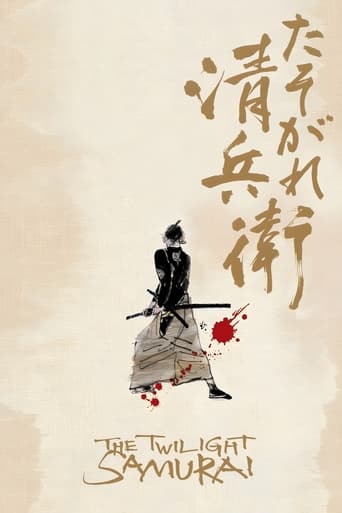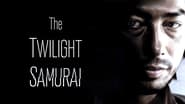Anssi Vartiainen
It's the waning twilight of samurai in the 19th century Japan. The old warrior class is being forced to adapt to the changing times and many of them have become common workers within their clans, while still clinging to their traditions, habits and systems of honour. One of these lower class samurai is Iguchi Seibei, who struggles in the samurai hierarchy because he cannot participate in their activities outside of work because he has to take care of his sick mother and his two young daughters, his wife having died of tuberculosis. They're poor, struggling financially, but things take a turn when Seibei is forced to fight against another samurai armed with only a wooden stick, yet emerging victorious. Also entering the story is his childhood sweetheart Tomoe, the sister of a high- ranking samurai within his clan.The Twilight Samurai transports you directly into a fascinating era where old and new order struggle for dominance. Samurai are done, their time is finished, but like all remarkable things, they cast a long shadow. This duality is explored through Seibei, whose very life is cast out of balance due to expectations both old and new. And within him we see the needed seed to survive, perhaps even prosper. The quiet dignity, quite separate from the judgement of his peers, which guides him. The understanding of priorities, of what's truly important in life. What is enough. What is needed.It's also at times quite an intense film. The final confrontation, where Seibei is forced to act on the behest of his clan, is quite a scene, filled with moments of raw fury, which in turn give room for quiet conversations about values.It's definitely a film worth seeing. Historically interesting, beautifully acted and with a story that has the strength to reach across cultures with its message.
Gregory Porter
The Twilight Samurai is a story, set at the turn of the century, about a petty samurai father, Seibei (Sanada), narrated by his then five-year-old daughter. Seibei's wife died of consumption leaving him to care for his dementia stricken mother, and two daughters. Seibei is of the samurai class though he works as a bureaucrat in the castle stores for a meager salary. IMDb summarizes the film as, "A 19th-century samurai tries to protect a battered wife." This only a minor plot point in the film. We follow him as he experiences tests of character with regard to his desires, his aspirations, and his duties to the clan.Now, this may be an embarrassing testament to my general ignorance of international movies but I mistook this for another film. There is a popular samurai series about Zatoichi (aka "The Blind Swordsman") that follows the adventures of, as you can probably guess, a wandering Samurai who is blind. According to Wikipedia, a total of 26 films were made in the '60's featuring this character. I thought that The Twilight Samurai was that. Clearly, any samurai movie is an action movie, right? Sigh, it sounds even more embarrassing when I write it. In my defense, the film The Blind Swordsman: Zatoichi came out in 2003. The Twilight Samurai is, in fact, a serious and really good drama. It won just about every Japanese film award possible and it's not too surprising.The acting is fabulous, the cinematography is beautiful, and the music and sound are just as good. I'm generally not a fan of narration. "Show me, don't tell," I think when I hear a narrator but I've certainly heard worse narration than that of The Twilight Samurai's. I'm also generally not a fan of children in movies (read: I generally loathe them in movies) but Seibei's daughters are adorable. They play a large part in the motivations of Seibei but they don't play a large part in the movie. They are there just enough to work their way into your heart and make you sympathize with Seibei; one can understand why he wants to stay at home, take care of them, and watch them grow.Overall, The Twilight Samurai is a very good movie. To my chagrin, I went in expecting a hack and slash but was enthralled by the story presented in front of me. It's happy and sad at the same time, and despite being a very Japanese movie, as an American, I found it accessible. By accessible, I mean that some movies use specific of cultural cues that either go over my head or don't jive with my American state of mind. I'll get more into detail about what I mean but it requires giving away some spoilers. This all said, I'd recommend The Twilight Samurai to someone interested in watching a more serious movie about the self and society and family. The only reason why I didn't give it a four out of four is because of some details surrounding the ending (which I will discuss next). Now, mind yourself of spoilers from here on out.I mentioned that The Twilight Samurai was a very Japanese movie. In my experiences with Japanese movies, there are some recurring themes, namely, responsibility to one's duty particularly with respect to community versus the self. In The Twilight Samurai, we see this through Seibei and his interactions with his clan.A friend of Seibei comes back from Edo (the capital city which was later renamed Tokyo) and offers to take him there for a promotion. Seibei respectfully declines saying that his dream is to eventually give up the title of Samurai and become a farmer with his daughters; he doesn't want to rise up in class because he's happy and content. Despite this desire to become a farmer, he is tasked with the job of killing a criminal samurai. The criminal was ordered to commit suicide but didn't, saying, "If you want me dead, you'll have to do it yourself." The criminal samurai is the best one-sword fighter in the clan so it's a high-risk task. Seibei attempts to defer the "honor" or responsibility to someone else but, eventually, accepts because it's his duty to follow the orders of the clan. The film doesn't stop at the "following orders" image. He accepts the task reveals that he intended to provide a route for escape rather execution.A while ago, I reviewed The Shonen Merikansak. It's a movie about a washed-up punk band that reunites. The movie seemed say, "Yeah, I wanna rock, so let's rock." The last shot of the movie, however, undermines that whole message. It changes to "Yeah, I wanna rock, but let's be serious and get back to work after this bit of fun." The Twilight Samurai contains the theme of duty but still gives Seibei the strength to balance responsibility to one's post with responsibility to one's moral code. Seibei explains that he intended on letting the criminal escape to the mountains.Unfortunately, the film takes an easy way out. After all, what would happen if he let the guy escape? What type of repercussions would he face? If he said that he let the guy go, Seibei would totally be executed. Well, we don't have to worry about it because the criminal samurai says, "I will escape…after I kill you." Conveniently, Seibei must defend himself and is thus rewarded with money, and his dream wife. Is it a deal breaker? No, but it feels like a little bit of a cop out
Fred1987
This is one of the best Asian movies for it's decade (2000-2010)..for second time i saw this masterpiece of Mr. Yamada yesterday and it makes me excited again! From a point of view, we will see Japanese classic culture in this movie which is about a single-poor swordsman , who has to take care of a family and his sick mother. and yet hi is happy, enjoying his humble-like life. Without any erotic scene in the movie, Mr. Yamada has created a sweet relationship between Seibei and Tomoe, that provokes emotions from our hearts! main characters have strong personality, especially Teibei shows us a smooth characteristic decisions and acts, making every viewer involve the movie and it's events.




